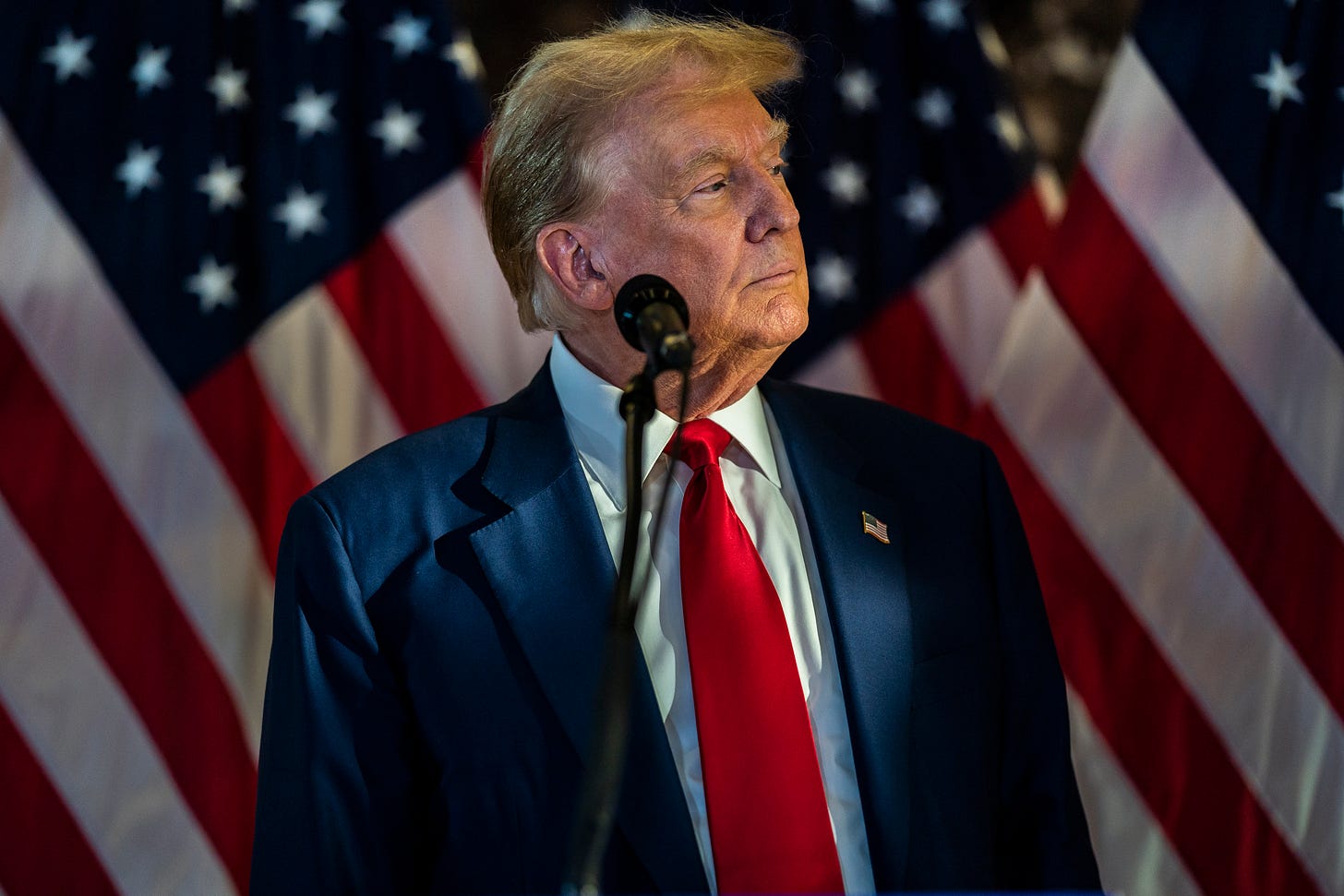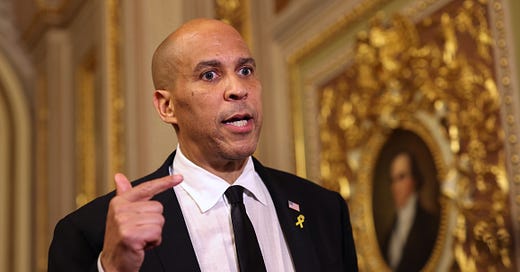
Trump Could Cost the Country Its Most Important Weapon
America’s greatest power is its example.

ONE OF MY EARLIEST MEMORIES of international politics was of a speech by President George H.W. Bush on Wenceslas Square in Prague in November 1990, on the first anniversary of the Velvet Revolution that ended more than forty years of Communist rule in Czechoslovakia. Bush spoke of “a new world of freedom born amid shouts of joy; born full of hope, barreling with confidence toward a new century; a new world born of a revolution that linked this square with others—Gdansk, Budapest, Berlin—a revolution that joined together people fueled by courage and by humanity's essential quest for freedom.”
My 7-year-old self did not appreciate his finer points, but the central message was clear: The United States was not only a great power but also a good, decent, and trustworthy one. For all of America’s flaws and hypocrisies, its virtues were central to the success of the post-war order that the United States built and to the unparalleled global power it has exercised since.
As the saying goes, “You don’t know what you got till it’s gone.” It pains me to predict that we are likely to learn the power of America’s example the hard way as Washington turns its back on any pretense of grounding its foreign policy in values or moral commitments.
Nations, including the United States, have four ways of getting others to do as they please: force, threats, bribery, and persuasion. All four methods are important, but what has really set U.S. leadership of the free world apart was persuasion, both active and passive. Since its independence, through its can-do culture and its dominance of science, culture, and the arts, the United States has inspired other nations to follow America’s example, cooperate with Washington on projects of mutual interest, or simply to emulate American practices in domestic politics.
To describe the power of America’s example is not to romanticize the past, nor to downplay the real tensions in, say, the transatlantic relationship. The peoples of Georgia and South Korea aren’t in the streets protesting authoritarian attempts by their governments because the Untied States attacked them, threatened them, or bribed them, but because those people want to live in countries that are free, open, representative democracies more or less on the American model.
However, the re-election of Donald Trump and the flurry of announcements from his team signal, particularly to our friends and allies, a qualitative change.
America can still be expected to throw its weight around and to use sticks and carrots. If the president-elect has an intuitive understanding of anything, it is one of bargaining and power relationships, informed by decades of experience in real estate and media. But leading by example or inspiring others to be better versions of themselves? Not so much.
Perhaps a more transactional approach to foreign policy will help produce a peaceful and prosperous world conducive to the flourishing of free societies. But, having witnessed the power of America’s example in Eastern Europe in the 1990s, I am not holding my breath.
When the United States spoke, Eastern Europeans listened. Radio Free Europe brought reliable information piercing through Communist propaganda. Anyone who had a chance to visit the United States saw immediately that Americans were doing something right—and that Eastern Europeans would do themselves a favor by trying to emulate their example. Even Madeleine Albright’s off-the-cuff comment about Slovakia becoming a “black hole” of Europe under the autocratic premiership of Vladimír Mečiar was central to the opposition’s success in the 1998 election.
Who, in Eastern Europe or elsewhere, would emulate the cadre of grotesquely unqualified nominees the president-elect has put forward for top government jobs—or, for that matter, Trump himself? Sure, foreigners may fear them, flatter them, and try to strike deals with them. But that is categorically different from the leadership by example and through soft power that remade much of the world in America’s image after World War II. And, as Nazis occupying the Czech lands learned quickly after 1939, there is no contradiction in being feared and mocked simultaneously.
One of Trump’s favorite rhetorical tropes is the notion that America is a “laughing stock” before the world. If the nominations of Robert F. Kennedy Jr., Peter Hegseth, or Tulsi Gabbard to important government offices indicate anything, it is that Trump has shed that concern. It is preposterous that any of the three would be taken remotely seriously by anyone in the world, just as it is absurd to imagine that U.S. broadcasting in countries from Georgia, to Afghanistan to China would be given an additional dose of credibility by the leadership of Kari Lake.
Will the United States be in a position to put pressure on improving governance or fighting corruption in, say, Ukraine or the Western Balkans? Appointing family members to coveted ambassadorial posts and letting the wealthiest man in the country run a new, fake government department makes the United States look like a struggling Eastern European nation, riddled with oligarchs and bound by networks of patronage.
Some amount of political corruption has existed under Democratic and Republican administrations before, illustrated recently by Hunter Biden’s shenanigans. Some on the left have over-reached, conflating good governance and democracy with a long list of progressive causes, alienating socially conservative societies, and losing ground to Russia’s propaganda depicting the Kremlin as a defender of family values and Christendom.
Yet, the Trump era does not offer a promise of course correction. It offers grotesque conflicts of interest and an image of internal political decay. Unlike in 2016, there is not even a pretense of ensuring that those in positions of influence divest from their business holdings. Forget about the Trump brand, hotels, or watches. It is widely expected and tacitly accepted that the likes of Elon Musk will use their proximity to the administration to make more money. The president-elect is threatening civil and criminal prosecutions against the media—with considerable success, so far—as well as against its political opponents.
What credibility will the next administration, or congressional delegations, have to tell the likes of Viktor Orbán or Bidzina Ivanishvili that kleptocracy and politically motivated prosecutions are unacceptable? If the United States will have any interest in fighting corruption and abusive government while promoting freedom, democracy, human rights, and the rule of law—and it’s far from certain it will—it will still have at its disposal threats, bribery, and possibly even force. But those are all more expensive and riskier than the power of example and moral suasion that held our allies—and often our adversaries—to higher standards.
The United States remains an indispensable nation. Even under the most isolationist of administrations, Washington will have to respond to and manage global events. The ongoing political rot—of which the looming corruption and the swath of frivolous nominations for top jobs in the next administration are illustrative—will make that job harder, not easier. Nobody should be surprised if Trump’s second term ushers in a world that is considerably less free, less joyful, and less confident than the one that President Bush Sr. welcomed alongside our new Eastern European allies thirty-four years ago.
















